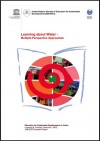Water Education

Water education at all levels needs to be improved if the challenges identified in the previous themes are to be met. Water education must go beyond the teaching of hydrological sciences, and be both multidisciplinary and interdisciplinary. This approach would include advancing scientific knowledge through the training of scientists as well as increasing knowledge on water issues through courses aimed at water professionals and decision-makers. Water education should also
reach out to media professionals so that they can communicate water issues accurately and effectively. The work will include community education strategies to promote communitywide water conservation, as well as enhance skills in local co-management of water resources. Efforts will be made to make water a significant component of the K-12 curriculum.
Objectives include supporting the enhancement of tertiary water education capacities, particularly in developing countries, promoting the continuous professional development of water scientists, engineers, managers and policy makers in the water sectors, as well as developing guidelines, briefing papers, prototype professional development programmes and case studies connected with water education for water security.
Water-related centres play an important role in this endeavour, in addition to the network of universities, institutes and research facilities linked to IHP’s other programmes. Case studies of leading practices in sustainable water management will be developed to maintain and expand the training of technicians in water-related fields. UNESCO’s Education Sector will continue to be a partner in the development of water-related materials and activities aimed at the K-12 curriculum.
Focal Areas
For more information on each Focal Area and related activities, please follow the links below:







